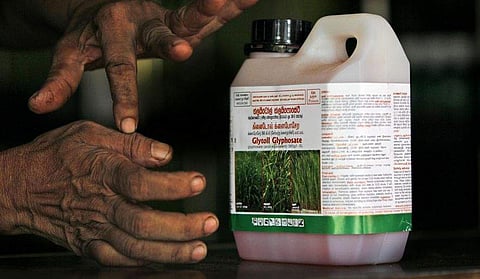Fresh EU bid fails to renew controversial weedkiller
BRUSSELS: The European Union on Thursday failed to win approval from members to renew a five-year licence for the controversial weedkiller glyphosate, which critics say causes cancer.
The European Commission said it fell short of the majority needed to renew the license when it expires December 15 as only half of the 28 member states voted for its proposal.
"Given that a qualified majority could not be reached ... the result of the vote is 'no opinion,'" said the commission, the EU executive.
The commission said it will now submit its proposal to an appeals committee by the end of November.
Luxembourg Environment minister Carole Dieschbourg welcomed the outcome when she became one of the first to tweet the result.
"Luxembourg voted against renewal and prolongation. Good outcome for our health and environment!," she said.
The European Commission said 14 states voted for its proposal, also including Denmark, Britain and the Netherlands. Nine voted against, including Belgium, France and Italy, while five abstained, including Bulgaria, Poland and Portugal.
The European Commission had originally recommended approving the herbicide's use for another decade.
However, faced with growing uproar over the alleged dangers of glyphosate use, member state experts balked last month at a renewal and the commission then proposed reducing the timeframe from ten years to five years.
Greenpeace urges ban
Environmental campaigners Greenpeace and other critics are calling for an outright ban in Europe for glyphosate, which is in the well-known weedkiller Roundup, produced by US agro-giant Monsanto.
Last month they handed the EU a petition signed by more than 1.3 million people backing such a move.
Despite the vote result, Greenpeace expressed concern that the commission will adopt its own proposal without backing of European governments, which it has the power to do.
"If the Commission continues to allow this toxic chemical to contaminate our soils, water, food and bodies, it is simply rewarding Monsanto for obscuring the dangers linked to its weedkiller," Greenpeace EU food policy director Franziska Achterberg said.
"The EU needs to ban it now, not in three, five or ten more years," Achterberg said in a statement.
Activists point to a 2015 study by the World Health Organization's (WHO) International Agency for Research on Cancer that concluded it was "probably carcinogenic".
France's government has said it wants to phase out the herbicide and environment minister Nicola Hulot, a celebrity green activist, said: "France's position is three years."
The European Parliament, the EU's only elected body, last month said glyphosate should be renewed only until 2022 and banned thereafter.
The European Food Safety Authority and the European Chemicals Agency both say glyphosate is unlikely to cause cancer in humans, in line with a 2016 review carried out by WHO experts and the UN Food and Agriculture Organization.
Monsanto insists glyphosate meets the standards required to renew its European licence.
The weedkiller deadlock in the EU has dragged on since June 2016, when its previous 15-year licence expired, and an 18-month extension was granted.
Europe's main farmers union, the Copa-Cogeca, said before the vote there is no alternative but to renew the licence if the continent wants to maintain yields.
"Neither emotions nor politics should govern such important decisions," the union's secretary general Pekka Pesonen said.
If there is no decision to renew the license, it will expire at the end of December. But it will still be possible to use up glyphosate stockpiles for another year.

